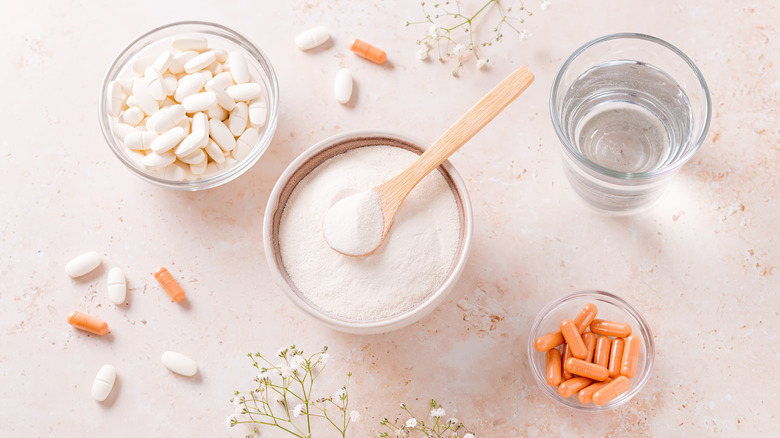Where Is Your Collagen Supplement Really Coming From?
Collagen is a popular addition to morning coffee, tea, and smoothies these days, and for good reason — it's a powerhouse for supporting healthy skin, joints, and hair, according to Healthline. With so many options on the market, do you really know where your collagen supplement is sourced from and why it makes a difference?
Collagen is an important protein that makes up the structure of our cells (via Healthline). It's comprised of three different amino acids: glycine, proline, and hydroxyproline. Together, these three strands form collagen's triple-helix structure, which makes up the framework of tissues and cells in the body. There are 28 different kinds of collagen found in connective tissues, skin, bones, tendons, and cartilage. As we get older, the cells that produce and maintain collagen become impaired, slowing collagen production. This contributes to signs of aging, like wrinkles and sagging skin. Many people choose to supplement with collagen powders or capsules, which can help treat signs of aging, as well as loss of skin hydration and joint pain.
The different sources of collagen
Since collagen is a large molecule, it's broken down into hydrolyzed collagen peptides to make it easier for our bodies to absorb (via MindBodyGreen). However, it's only available through animal products, so any collagen supplements you see on a shelf are going to be sourced from animals. A popular choice is bovine (or cow) collagen peptides. It's important to be mindful of how the cows were raised and what they were fed when choosing a collagen supplement. Collagen that comes from humanely raised, grass-fed, or pasture-raised cows is always best. Chicken collagen that comes from chicken bones, cartilage, and eggshell membranes is a less popular choice, but make sure it's still coming from grass-fed chickens.
For pescetarians, there's marine collagen that comes from fish skin, scales, and bones (via MindBodyGreen). Research shows that it has similar benefits as bovine collagen, supporting the skin, gut, and bones. It's important to purchase marine collagen that comes from clean, wild-caught, sustainable options. Unfortunately, there's no such thing as "vegan collagen," although some brands may try to advertise it as such. Rather than actually providing a source of collagen, these products may contain nutrients and bioactives that support collagen production and synthesis, like amino acids, vitamins C, E, B, and botanical antioxidants.


